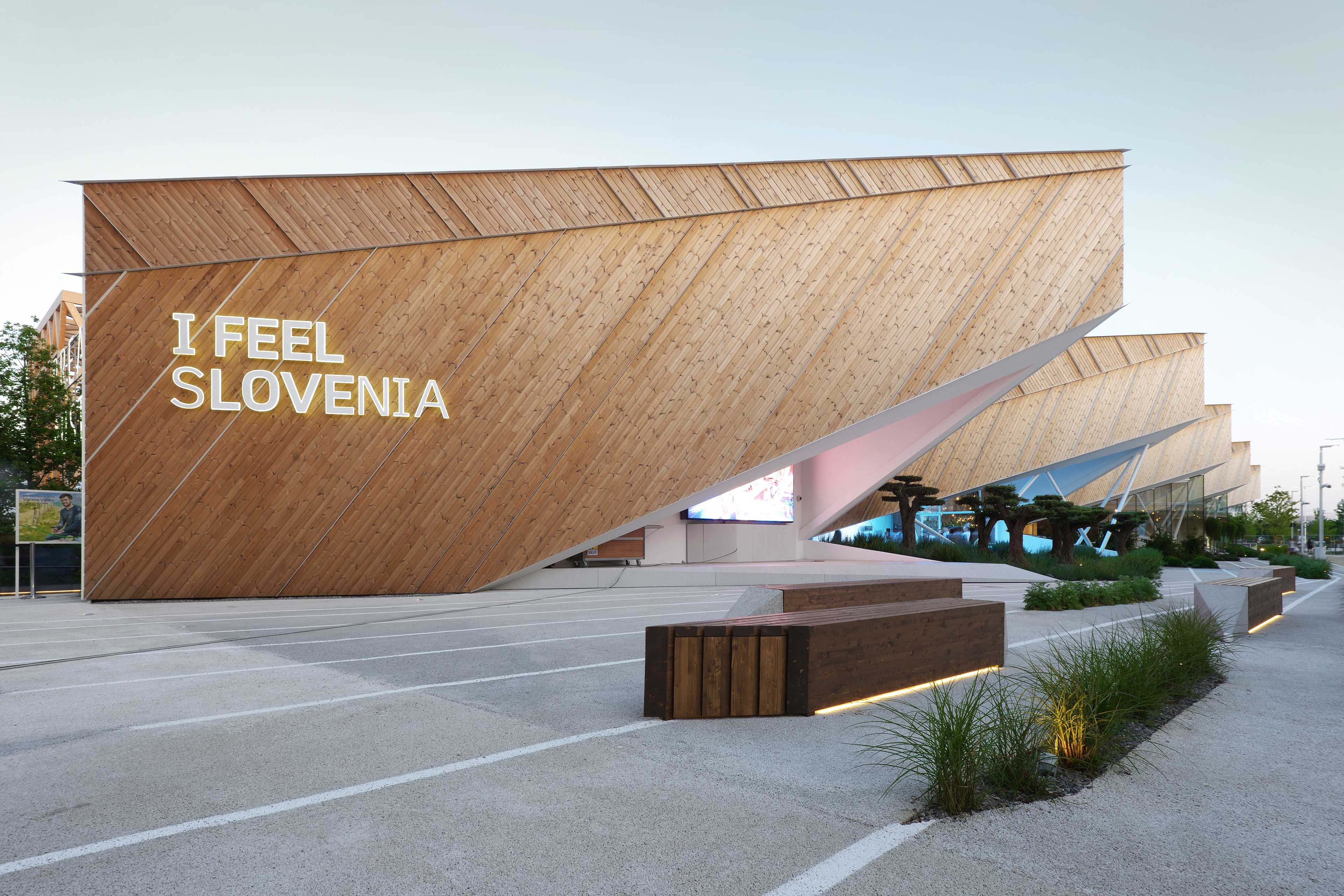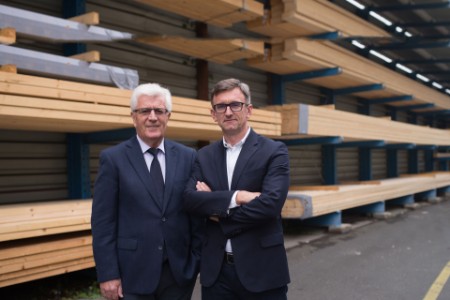Committing personal assets to start a company
The beginnings of Lumar IG, founded by Milan Lukić, date back to 1992. As he believed in the knowledge, people, products and future of prefabricated construction, he committed almost all of his assets to start up a company. Over the years the company has had its share of ups and downs. A few years ago they sold the company to a major Austrian group as they hoped to gain access to foreign markets. However, very soon it became clear that the philosophies of large commercial groups and small family businesses differ significantly. This prompted them to buy back the company and to independently penetrate the Austrian market.
Today the company is the leading Slovenian manufacturer of low-energy and passive prefabricated buildings. According to Milan's son Marko, the owner and since 2001 also Director of the family business, they can say that “with our own hard work and knowledge, excellent employees and long-term partners, we have succeeded in developing a trademark that is recognized and successful at home and abroad.” In addition to the Slovenian market, Lumar IG is also present in the Italian, Austrian, Swiss and German markets, which altogether account for 40% of total sales. In 2014 a team of 61 staff generated just less than €900,000 of net profit.
They are proud of their sound business approach, which undoubtedly has influenced their success. The company has no loans, no payables to subcontractors or partners and meet their financial obligations before maturity. This allows them to continually invest in development. “I have always believed that it is better to keep the money on the business account than on my personal account,” explains Milan, who has transferred this practice to his son. This is reflected in their excellence, which is continually recognized by others: in 2015 Lumar IG was voted one of the 50 Slovenian companies with the highest credit rating. “We have never aimed to accelerate our growth. Nevertheless, our results are continually improving. In the first seven months of 2015, we have sold more than in the whole of 2014,” proudly explains Marko.

Belief in technologies that everyone else made fun of
In the past few years, the company has developed into highly technologically-advanced and innovative enterprise. “We have developed and believed in technologies, which others initially made fun of,” proudly explains Marko. As early as 2007 they were confident that passive construction would take strong roots and develop in the future - and this future is here now! The company continues to develop and improve their passive technologies. The company has certified two passive systems and two passive houses at the German Passivhaus Institute, as well as one in Austria. “The Lumar DNAcan be observed and recognized in our passive and low-energy houses,” explains Marko. Theirs was the first company which developed their own standard houses in cooperation between their own architectural office and external architects.
Marko is confident that their success is due to the large amount of knowledge, potential and loyalty of the employees, as well as the result of the cooperation with first-class subcontractors and partners with whom they grow and develop products. All these attributes are reflected in high quality of houses and customer satisfaction.
You have to earn your position in the company; nothing is taken for granted
For the Lukić family, their company is more than a mere financial investment. The family spirit is combined with long-term vision and daily involvement in the company's development. To show that the company's welfare is at the top of priorities, individual functions and responsibilities must be clearly segregated even in a family business. “Early on, the family agreed that it should be clear to any third parties joining the company that individual functions cannot be taken for granted as family roles,” explains Marko.
The family believe that the two main advantages of a family business are flexibility and a rapid decision-making process, supported by knowledge, development potential and a sense of responsibility. In a family business it is difficult to distinguish the fine line between business and private life. “This may not necessarily be bad,” ponders Marko. “Perhaps sometimes there is just a little bit less time for one to relax.” Both father and son agree that another key factor in a family business is that the owners are an example for all other employees, in order to create the relevant authority, atmosphere and hierarchy. “Again, this is not such a difficult task, particularly if you are the one who is frequently the last one to turn off the lights, you work hard, are fair and provide the necessary security and a healthy environment for people to work in,” adds Marko.
“I have always believed that it is better to keep the money on the business account than on my personal account,” explains Milan.
From sportsman to decisive manager
Today the company reins are firmly in the hands of the second generation, while the third generation of the family is gradually learning about the company and its operational processes. “Management transfer was implemented quickly and successfully, without any major hiccups,” explains Milan and adds: “I am aware that handing over the reins to the next generation may sometimes be a real problem.” However, in the Lumar family business, this was no issue as Marko, former top athlete, has always been interested in the company. He entered it at a crucial moment, when the German market began to encounter problems: “At that time, our products accounted for 85% of our turnover, compared to the current 30%, and this resulted in a change in the business model.” Soft transition of the management took just over two years to complete. “In my opinion, the key to success of the Lumar family business is that we have reconciled our differences of opinion, combined a wealth of experience and new ideas and used these as the common denominators to find what is best for the business. At times our egos had to be put aside,” says Marko in illustrating the transfer of the company management. Milan adds: “In 2009, when we received the Golden Gazelle, we realized the importance of a frequent exchange of views between Marko and me, for the company's performance. As a top athlete he was not used to accepting compromises and he remains true to these principles. Of course there are differences between us: he is rather studious while I've got the courage.”
Marko's mother Hilda is a co-owner, helping with accounting, and has brought new strengths to the company. Milan's sister, an economist, also works in the company as Head of Finance.
World-class businesses are not granted indulgences
“Living your life to the full does not only mean achieving individual comfort and well-being, but it is also about having a comprehensive and responsible attitude towards the environment in which we work and live,” says Marko, describing their slogan ‘Live life to the full’. Therefore, when designing Lumar houses, the future owner of the house is at the forefront of our attention: the house must comply with high aesthetic criteria, be comfortable and usable, and provide sufficient light. It must be a high quality building and pleasant to live in.
They intend to actively and forcefully promote these features in foreign markets: “With the establishment of Lumar Haus, based in Vienna, we have entered the traditional Austrian market and in the first few months of operations we have realized that our quality solutions, architecture and high quality execution, provide potential for growth and further development.” As a family business they have no need to sell large quantities of houses, and this drives their optimism and confidence that in the long term they could sell about 30 houses annually in the Austrian market. They are also targeting Germany and Switzerland, where they intend to increase their sales activities.
Although operating in traditional industries, they are constantly looking for challenges and opportunities in other areas. This is what drives them forward, makes them stand apart from others, and in the long term brings positive results and contributes to brand recognition. “Certainly, long-term development requires maintaining the position of the technologically most advanced manufacturer and remaining a high-quality and reliable partner for the construction of the house,” confirms Marko. What other goals are pursued by Lumar? Based on further strengthening of development, they are already preparing analyses and plans for a development centre, which will secure their important competitive advantage in the future. “It is great when you are good; however, when you reach the top, the real art is to preserve quality. While an average company may be allowed certain lenience, the one at the top is not. Nobody will allow you that luxury,” says Marko, sharing his thoughts about the dangers of complacency.
Summary
Lumar in a nutshell: “Family, innovation, development, quality, satisfaction.”


